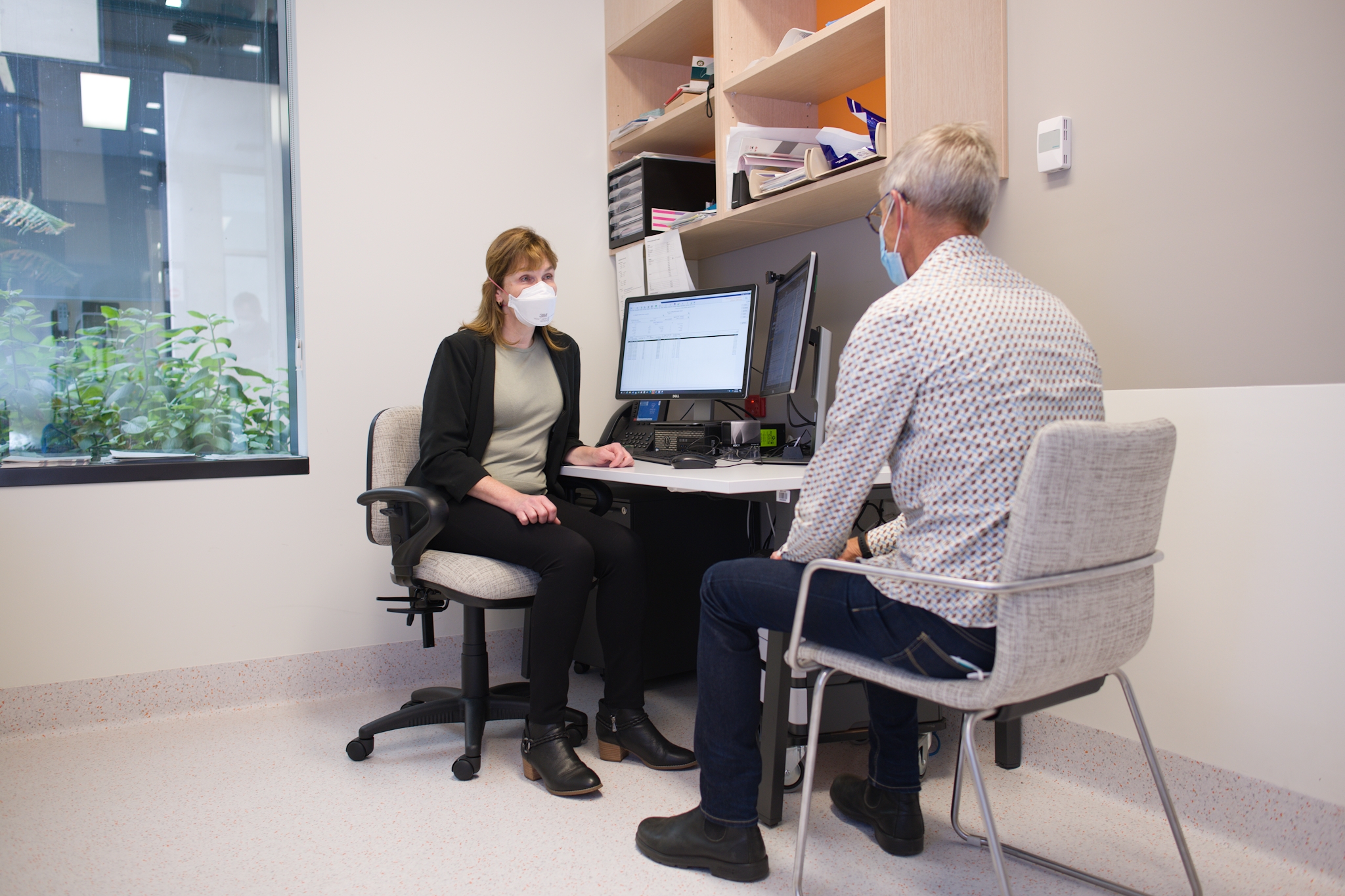This page provides an overview of ways to look after yourself throughout the cancer journey and where you can seek support.

Complementary (or integrative) therapies are used alongside conventional cancer treatments such as chemotherapy, radiation therapy or surgery. They do not claim to cure cancer but aim to support overall wellbeing - to reduce stress, improve sleep, relieve symptoms or reduce side effects of treatment.
Common complementary therapies include:
Some complementary therapies have been scientifically researched and shown to be safe and effective. However, many others are not. Some natural products or supplements can worsen side effects or reduce the effectiveness of conventional cancer treatments. Importantly, there is no scientific evidence that complementary therapies can treat or cure cancer itself.
If you are using - or thinking about trying - complementary therapies, it's important to talk to your doctor or cancer care team.
This is to ensure:
Open communication with your healthcare providers helps ensure you get the best possible care and outcomes.
The Cancer Council do not recommend using alternative therapies as a cure for cancer.
People often use the terms complementary and alternative therapies interchangeably, but they are very different. Complementary therapies are used alongside conventional cancer treatments, whereas Alternative therapies, are used instead of standard medical treatments.
Some practitioners promote these unproven therapies as cures for cancer, which is misleading and potentially life-threatening.
If you're considering using alternative therapies, it's essential to speak with your doctor or cancer care team first. They can help you understand the risks, guide your choices, and ensure that any supportive therapies you use are safe and evidence based.
Further information on complementary therapies:
What are Complementary Therapies? | Cancer Council NSW
Integrative Medicine | Memorial Sloan King Cancer Center
Integrative Medicine | Cleveland Clinic

Eating healthy food can help you cope with treatment and side effects. A balanced diet gives your body the nutrients and energy it needs to stay as well as possible throughout your cancer journey.
If you have dietary requirements, a dietitian can explain how to manage any special dietary needs or eating problems and choose the best foods for your situation.
It is also very important to drink lots of water throughout each day unless advised otherwise by your healthcare team, as water can help flush toxins out of your body and keep you energised throughout treatment.

Physical activity can have many positive impacts including reducing tiredness and improving circulation. It may also enhance your response to cancer treatment and lower the risk of getting other illnesses. Exercise is well known to be beneficial for one’s mental health, boosting happy chemicals in your body.
Many people going through cancer treatment may feel restricted in how much they can exercise – it is important to talk to your doctor or other healthcare team member to develop the best exercise plan for your situation.

A diagnosis of cancer may lead to financial challenges, especially if you have extra unplanned medical expenses, costs of transport to and from appointments (including hospital parking) or loss of income if you need to reduce how much you work or stop working altogether.
You have a right to know how much you will pay for your treatment, and it is the responsibility of your doctors and health care providers to outline the likely costs prior to treatment. This is known as informed financial consent.
If you are concerned about the financial impact of a cancer diagnosis, ask your doctor to refer you to a social worker who can provide information about financial assistance and may be able to help with submitting forms or applications.
The Cancer Support Services and Support for Carers sections include practical resources that can assist with financial challenges.
More resources are included below:
Cancer and your finances | Cancer Council
Financial Support | Rare Cancers Australia

Cancer can affect your work life in many ways. The symptoms you may experience from any treatments may influence your ability to work at your full capacity. You may also have medical appointments or treatments during work hours that require you to take time off work.
You should discuss with your employer whether you wish to (or are able to) continue working throughout your cancer journey. You do not need to tell your employer that you have cancer, but if you decide to return to work, you must inform them about anything that may affect your ability to perform essential parts of your job, or that may cause a health and safety risk to others. You should talk to your employer about any flexible working arrangements or other supports that they may be able to provide you with.
More information is included below:
Cancer, Work and You | Cancer Council

Being diagnosed with cancer can be extremely stressful and distressing, which can often have a significant impact on your relationships with loved ones, friends, or work colleagues. Make sure to respect and acknowledge the concerns of others, as it can be challenging for them too. While some friends and family members are incredibly supportive, others might struggle to know how to respond, which can lead to feelings of isolation or confusion. They may find it difficult to understand what you are going through and feel unsure of how to best support you throughout your cancer journey. It is important to give yourself and others time to adjust to this new situation and be open and honest about how everyone is feeling. This can be very helpful in navigating this challenging time.

Cancer can affect your sexuality in physical and emotional ways. Physical changes such as fatigue, pain, or hormonal fluctuations, and emotional factors such as fear or anxiety related to your diagnosis, can also affect your desire for intimacy. This could depend on the type of treatment you receive, side effects from treatment, energy levels, or self-esteem. Intimacy can take many forms. That is, although sexual intercourse may not always be possible, closeness and sharing can still be part of your relationship. Non-sexual affection, cuddling, or even spending quality time together can help maintain the emotional bond with your partner.

If you are able to engage in sexual activity, your doctor may recommend certain types of contraception to protect your partner or avoid pregnancy temporarily. They will also tell you how your treatment may affect your fertility, and whether the effects are temporary or permanent. If starting a family is important to you, you should talk your doctor before initiating treatment. They can provide information about fertility preservation options, such as egg or sperm preservation. These should be explored before commencing treatments, as some cancer treatments may have an impact upon fertility.

Receiving a diagnosis of CUP can often feel overwhelming. You may experience a range of emotions when you are first diagnosed and throughout treatment, such as fear, sadness, uncertainty, anxiety, depression, anger and frustration.
The uncertainty of not knowing the primary source of cancer can intensify feelings of fear and loneliness. It’s important to express these emotions and talk to others about how you are feeling. Your friends and family will usually do as much as they can to support you. Additionally, cancer patient support groups and health professionals such as social workers, counsellors, psychologists and psychiatrists are all invaluable resources that can be accessed at any stage of your cancer journey. You may also find comfort in discussing your thoughts and feelings with religious or spiritual advisors. Visit the support and services section for a comprehensive list of resources to cope with both the emotional and practical aspects of living with CUP.
Dealing with feelings of sadness

Depression is a common experience for people who are living with cancer. If you find that you have difficulty in your daily activities such as getting out of bed, have lost interest in hobbies that you once enjoyed and have persistent feelings of sadness, you may be experiencing depression. It’s important to talk to your healthcare team about these feelings, as sessions with professionals, or short-term medication such as antidepressants, may be beneficial in managing how you feel. You can ask your doctor if you are eligible for a Medicare rebate for psychology sessions as some individuals may qualify. You can usually get up to 10 psychology sessions covered, and up to 15 if you are also seeing a psychiatrist.

For further support for coping with mental health conditions, call Beyond Blue at 1300 22 4636 or visit beyondblue.org.au
If you need immediate support, Lifeline is available 24/7 and can be contacted at 13 11 14 or at lifeline.org.au
Here are the links to other information pages to learn more about different aspects of supportive care. You may also use the quick links on the right side of the page to navigate.

Most people are diagnosed with cancer of unknown primary (CUP) after they have symptoms or become unwell. Some people may be diagnosed during tests for another health condition. When cancer is suspected, you might be referred for tests or to a specialist.

The treatment you have depends on a number of things, including where the cancer is and your general health. A team of doctors and other professionals discuss the best treatment and care for you. The main treatment for Cancer of Unknown Primary is cancer drugs, most commonly chemotherapy. You may also have radiotherapy to help to control your symptoms and hormone therapy.




